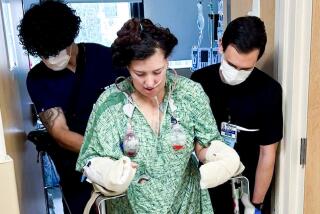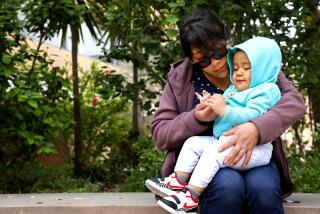Woman Dies 18 Years After Bullet Ripped Her Life Apart
When they buried Neomi Montijo on Friday, an 18-year ordeal ended.
During the service in a Long Beach chapel, family and friends tried to remember the Neomi they knew before a bullet smashed into her skull, before the robust 14-year-old became a crippled girl whose body concealed the piece of evidence that might have convicted her assailant.
“She was the only sister we had. We spoiled her,” said Angel Montijo Jr., one of her six brothers, his voice cracking before 70 mourners.
Her cousin and best friend, Rosemarie Montijo, 32, recalled how they had just entered high school and Neomi was so elated to have made the cheerleading squad.
“It’s just so weird, the bullet came out of nowhere,” she said.
Neomi was shot Nov. 28, 1974, on the Harbor Freeway as she and her family drove to a relative’s Thanksgiving Day dinner, their first in California after moving from Brooklyn, N.Y., that year.
She died Monday of complications caused by the wound.
From the beginning, police had a suspect, a man who was shooting at street lights and tree limbs with a high-powered rifle 200 yards from the freeway. They believe one shot went astray.
The man was briefly charged with attempted murder but authorities had to drop the case because of lack of crucial evidence: the bullet, which might have been matched to the man’s rifle, lodged in Neomi’s brain. Surgery to remove it was considered too risky.
The bullet now appears too eroded to be used as evidence, authorities said this week.
Although a victim’s death can reopen a case, the death must come within three years for manslaughter or second-degree murder charges to be filed, said Mike Botula, spokesman for the Los Angeles County district attorney’s office. There is no statute of limitations for first-degree murder, but that charge was never considered.
“It doesn’t appear that there are any charges that can be filed now,” Botula said.
That bothers Los Angeles Police Detective Jerry Johnson, who investigated the shooting.
“This stayed with me,” Johnson said. “It’s so sad to see a kid lying there like that . . . and it never got any better. I’ve learned to deal with these things over the years not so personally, but this one--this one was so sad.”
Relatives also are frustrated, although their feelings are tempered by the end of the suffering.
“We feel happy in a sense,” said Daniel Montijo, another brother. “We believe in God. He’s going to take care of the justice. But we hope the law is changed in the future. The system needs to be changed.”
Angel Jr. was resigned to the outcome of the criminal case. “The shooting wasn’t intentional,” he said. “It happened. I accept it.”
But others still were struggling to come to grips with the tragedy.
“God, why did you take her?” Eva Montijo shouted over her daughter’s coffin.
It happened in a flash 18 years ago.
Neomi was seated beside her father, Angel Sr., who was driving. Her mother and two brothers were in the back seat.
Near 111th Street, they heard what sounded like an explosion, then glass shattered as the bullet rocketed through the passenger side window.
Angel Sr. pulled over to the freeway’s shoulder. His bloody daughter was unconscious.
Taken to a hospital, she came out of a coma after several months. But she was blind, paralyzed, and could speak only haltingly, unable to carry on meaningful conversation.
Family members said they took some comfort when “Mimi,” as they called her, seemed to recognize their voices with a grin, a few words, or perhaps a tear.
“I would say: ‘Hi, Mimi, how are you doing today?’ ” Angel Jr. recalled, “and she would start to cry and she would say: ‘Hi, Junior!’ She knew all our voices, but she could never physically see us.”
Rosemarie remembered visiting the hospital and watching her best friend’s body tremble uncontrollably. She kept up her visits, and said Neomi once confided in her: “I know what happened to me.”
But Neomi never got well enough to go home. She spent the rest of her life in hospitals or convalescent homes.
Nurses said she loved music, so they regularly kept a radio turned on beside her bed.
“She would just sing and sing,” said Deanna Harnage, an employee at the convalescent home where Neomi last stayed.
Constantly battling pneumonia and undergoing frequent operations to relieve buildups of fluid in her lungs, she was back in the hospital again last week. Angel Jr. and his father visited Sunday, making them the last family members to see her alive.
“My dad said: ‘Mimi, give me a kiss’ and she would form her lips like a kiss. I said: ‘Mimi, if you can hear me, squeeze my hand’ and she did,” Angel Jr. said.
More to Read
Sign up for Essential California
The most important California stories and recommendations in your inbox every morning.
You may occasionally receive promotional content from the Los Angeles Times.









